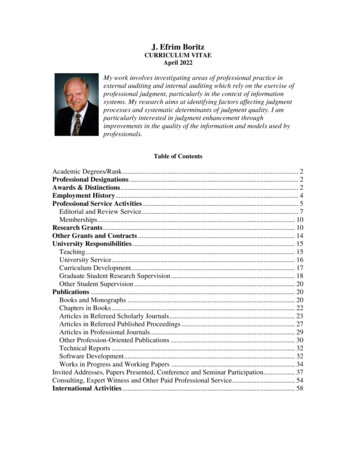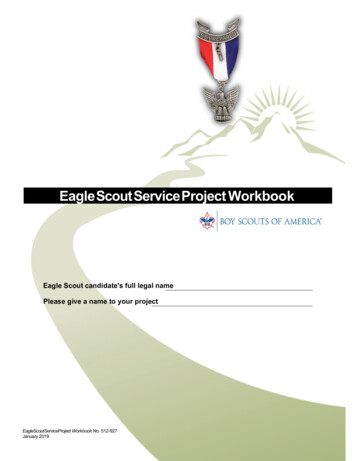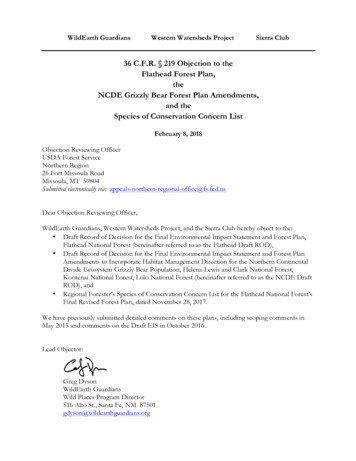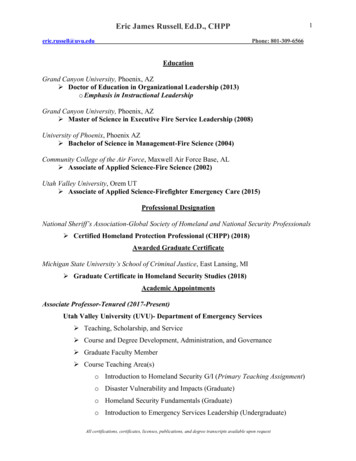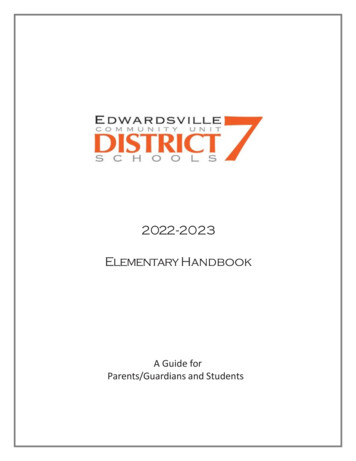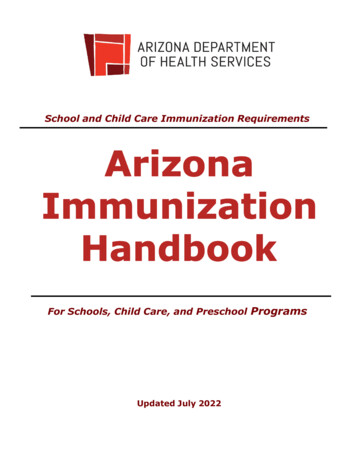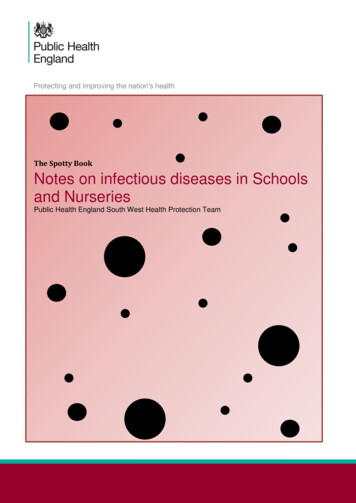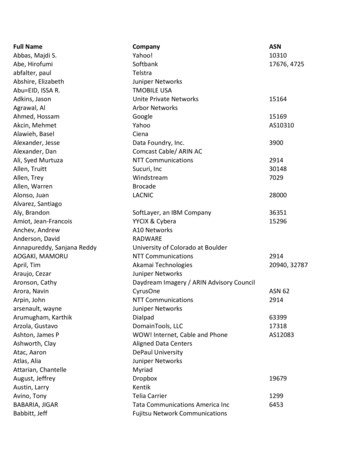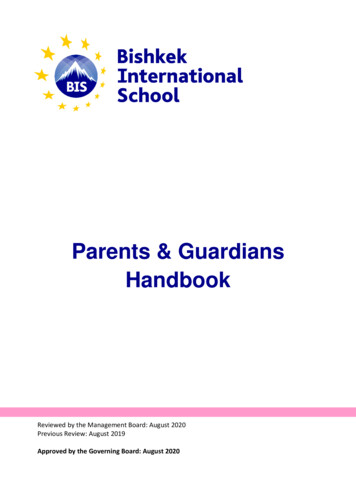
Transcription
Parents & GuardiansHandbookReviewed by the Management Board: August 2020Previous Review: August 2019Approved by the Governing Board: August 2020
PrefaceMission, Policies, Handbooks and RegulationsThe Mission of Bishkek International School is to enable our students to: Develop their intellectual curiosity and achieve their academic, sporting and creative potential; Be confident in their abilities and respectful of others; Learn about local and global issues and prepare to tackle common challenges.In a school which: Delivers and celebrates excellent teaching for internationally accredited education; Values diversity and inclusivity; Promotes the well-being of the whole school community; Contributes positively to development of the Kyrgyz Republic.This policy is one of several policies, procedures and related documents that guide operations at BishkekInternational School (BIS) and help to facilitate the achievement of our mission. The full list of relevantdocuments, prepared by the Management Board and approved by the Governing Board, comprises:Policies:1. Vision, Mission and Development Policy2. Admissions Policy3. Learning Diversity and Inclusion Policy4. Language Policy5. Academic Honesty Policy6. Assessment Policy7. Health & Safety Policy8. Child Protection Policy9. Educational Visits Policy10. Ethics Policy11. Environmental Policy12. Accounting PolicyHandbooks:1. Staff Handbook2. Parents & Guardian Handbook3. Student HandbookAll Governing Board members and all staff must be aware of each of these documents and their contents.All policy documents and handbooks are available to students and parents/guardians via the BIS website orprovided in PDF form to parents/guardians on request. All policy documents and handbooks are reviewedand revised by the Management Board every year, normally in April/May for approval by the GoverningBoard in June for the following academic year. All students, parents and staff are invited to send commentsand suggest any changes to the Management Board at any time before the end of April each year forconsideration for policies/handbooks for the next academic year.Overall Governance of BIS is guided by the legal charter and various internal regulations. These are:1.2.3.4.Legal Charter of ‘ESCA-Bishkek International School’Regulations of the Governing BoardRegulations of the Parents AssociationRegulations of the Advisory Council
International BaccalaureateBIS is an International Baccalaureate World School, offering the International Baccalaureate DiplomaProgramme (DP), the Middle Years Programme (MYP), and the Primary Years Programme (PYP). IB WorldSchools share a common philosophy and commitment to high quality, challenging, international educationthat BIS believes is important for our students. For further information about International Baccalaureate,see www.ibo.orgInternational Baccalaureate mission statement“The International Baccalaureate aims to develop inquiring, knowledgeable and caring young people whohelp to create a better and more peaceful world through intercultural understanding and respect. To thisend the organization works with schools, governments and international organizations to developchallenging programmes of international education and rigorous assessment. These programmesencourage students across the world to become active, compassionate and lifelong learners whounderstand that other people, with their differences, can also be right”International Baccalaureate Learner ProfileThe aim of all IB programmes is to develop internationally minded people who, recognizing their commonhumanity and shared guardianship of the planet, help to create a better and more peaceful world.The IB learner profile represents 10 attributes valued by IB World Schools. We believe these attributes, andothers like them, can help individuals and groups become responsible members of local, national and globalcommunities.1. Inquirers: Develop a natural curiosity that allows them to become lifelong learners.2. Knowledgeable: They explore ideas of importance and dig deep into its meaning creating a balance oftheir learning.3. Thinkers: They apply thinking skills that allow them to tackle complex problems in creative ways.4. Communicators: They understand and can articulate information in confident, creative ways, including asecond language.5. Principled: Students are honest, fair, just and full of integrity. They strive to solve their own problemsand to take responsibility for their own actions.6. Open-minded: Students understand and embrace other cultures. They recognize and celebrate their ownbackgrounds and learn tolerance for others.7. Caring: Students actively care about others and participate in active service.8. Risk-Takers: Students are brave in the face of new challenges. They strive to take on new roles and todefend their own beliefs.9. Balanced: Students understand the need to be emotionally, physically and mentally balanced. Theystrive for this in themselves and others.10. Reflective: Students reflect on their own learning. They are able to adjust for weaknesses and strengths.
Contents1INTRODUCTION12ESSENTIAL INFORMATION FOR PARENTS13HISTORY OF THE SCHOOL44VISION, MISSION & COMMITMENTS45GOVERNANCE & MANAGEMENT STRUCTURE56CODE OF CONDUCT67COMPLAINTS AND APPEALS PROCEDURES128CURRICULUM & ACCREDITATION149TEACHING METHODOLOGY1410 ACADEMIC HONESTY POLICY1511 HOUSES1512 STUDENT COUNCIL1613 STUDENT SUPPORT1614 TIMETABLE1615 EXTRA CURRICULAR ACTIVITIES1616 SCHOOL EVENTS1717 STUDENT ABSENCE1718 COMMUNICATIONS1719 SECURITY1820 AIR QUALITY INSIDE & OUTSIDE2121 OTHER ISSUES21APPENDICES23ANNEX 1: ESSENTIAL INFORMATION FOR THE FIRST WEEK OF SCHOOL23ANNEX 2: PRESCHOOL GROUND-RULES234ANNEX 3: PLAYGROUND RULES25ANNEX 4: BEHAVIOUR INCIDENT REPORT26ANNEX 5: TEXTBOOK DEPOSIT SCHEME27ANNEX 6: SCHOOL BUS RULES28ANNEX 7: MINIMUM STANDARDS TO BE AWARDED A HIGH SCHOOL DIPLOMA29ANNEX 8: AIR QUALITY & OUTSIDE PLAY GUIDELINE30ANNEX 9: ACADEMIC YEAR 2019/2020 CALENDAR30ANNEX 10: OUTLINE TIMETABLE32
1INTRODUCTIONThis handbook gives important information for Parents & Guardians of BIS students.Sections highlighted in green are repeated in the Student Handbook and the Staff Handbook.Sections highlighted in pink are repeated only in the Staff Handbook.Please note that if the school is operating at Levels 1, 2 or 3 of the COVID-19 Protocol, the COVID-19protocol overrules anything in this document wherever, the documents contradict.2ESSENTIAL INFORMATION FOR PARENTSEssential information for the first week of school is given in Annex 1. This section covers more generalinformation.2.1 Equipment and clothing requirementsEquipmentThe basic requirements when a student starts school are: Backpack/bag to carry books and belongings to/from schoolHat/cap for outside in hot weather OR warm coat and hat for cold weatherA bottle for drinking waterFor Preschool and Primary school, indoor shoes for inside school if you have dirty shoes/boots fromoutside and need to change when you come insideFor High School, bring a laptop to work on at schoolNo stationary is required as BIS provides the first basic set of stationery for each student. Replacements mayneed to be purchased by parents later.School ClothesBIS does not have a school uniform; however, we have a code of dress given in Section 6.3 of this handbook.In addition to the dress code, parents should make sure their children are sensibly dressed for an active lifeas our students are very active during play breaks.Physical Education ClothesWhen students have PE in the timetable, they need to wear trainers and a T shirt and shorts or a tracksuit,so make sure they have PE clothes on PE days.Art ClothesAll preschool, primary and middle school students have Art as part of the curriculum and it can be messy. Tokeep normal clothes clean, parents are advised to provide an extra-large shirt (or something similar) for theirchild to wear over their normal school clothes.Lost PropertyEvery school has difficulties with lost property. To make identification easier, it is best to permanently markyour child’s property with their name. Lost property is kept centrally and will be ‘recycled’ to a worthy causeat every term break if it is not reclaimed before the break.ValuablesThe school takes no responsibility for any phones, toys or other possessions brought into school by studentsand any loss or damage is the responsibility of the student concerned.1
2.2 The First Day of SchoolThe first day of school can be a daunting time for young children, particularly if they are in a strange country.Some children settle very quickly and enjoy the social interaction from the beginning but some children maybecome distressed.For young children it is best to go to school with your child on the first day to meet the teacher and handover your child.2.3 Arrival time at schoolArrival time at school is from 7:30 to 7:45 for Middle and High School, 7:45 to 8:00 for Primary, and 7:45 to8:15 for Preschool. Teachers are available in class rooms at 7:45 am. Students should not arrive before 7:30and all students must be in class before 8:00 at the latest in Primary, Middle and High School. High Schoolstudents should go directly to their form class when they arrive at school. Primary and Middle school studentswho arrive before 7:45 should stay in the café until 7:45 before going to their own classroom at 7:45.2.4 Pick-up time from schoolStudents may be collected from school either at 15:30 at the end of the school lessons and break or from16:30-17:30 after Extra-Curricular Activities. School buses leave at both 15:40 for those not taking ECAs andat 16:40 for those taking ECAs. All students must be collected before 17:30. After 17:30, gates are lockedand only the night security guard is at school.2.5 School BusA school bus service is offered with pick-up from 07:00 to arrive at school at 07:45. Buses leave school atboth 15:40 for those not taking ECAs and at 16:40 for those taking ECAs, with drop off according to schedule.Each bus has a bus supervisor from BIS staff in addition to the bus driver. Parents wishing to sign up for thebus service should contact info@bis.kg or phone the main office: 0312 21 44 06. School bus rules are givenin Annex 6.2.6 HomeworkStudents in Preschool and Primary 1-4 do not normally receive homework.Primary 5 and 6 students may have homework every day. Middle School Students also receive homeworkevery day from subject teachers. All students from Primary 5 up to MYP3 have Student Diaries, wherestudents should write their homework requirements. Diaries are checked by Form Teachers every Friday, andindividual subject teachers may also write comments in the diary. Parents of MYP students should reviewStudent Diaries each weekend and more often than this if required for a student who is less organizedthemselves.Students in IGCSE and Diploma have homework every day and are expected to be responsible to completetheir homework without parental involvement.2.7 Questions about your child’s education or about BISIf you have any questions, the first person to ask is your child’s Homeroom/Form Teacher or Co-Teacher.They will arrange for you to see a specialist teacher or someone in BIS management if they cannot deal withyour questions themselves. Homeroom Teachers, Form Teachers and Co-Teachers can be reached by email.A list of emails will be given to you when your child starts school and will be updated every year. Alternatively,you can call BIS Reception 0312 214406 to arrange an appointment with the Homeroom/Form Teacher.If you have more general questions about the class or the school that you think affects other children andparents, you can raise the issue with the parent Class Representative appointed by the Parents AssociationManagement Committee (PAMC). A list of members of the PAMC and Class Representatives will be given to2
you when your child starts school and will be updated every year. If you do not have the list, you can emailpamc@bis.kg for information.2.8 Appointments to see BIS staffAppointments should be made in advance, either by emailing the person you want to see to arrange themeeting, or by contacting the Reception and making an appointment to see a particular person at an agreedtime. If you are at the school and speak to Reception, it may be possible to arrange an immediateappointment but often this is not possible due to other staff commitments at the time.2.9 Lunch and snacksBIS provides morning snack, lunch and afternoon snack for all students. Parents may opt out of lunch for afull term if they want to provide lunch themselves. Please note that fizzy drinks, sweets (candy) and packetsof crisps (chips) are not allowed in school.Students are not allowed to order in food to be delivered to school under any circumstances and food is notallowed to be eaten anywhere in the school except in the café.If your child would like to share a cake with friends on his or her birthday, this may be arranged with theHomeroom/Form Teacher or Co-Teacher.2.10 Student attendanceFull attendance is important for academic achievement and social interaction. If children are ill, parentsshould inform the school before 10.00 am on the first day of absence.To ensure a healthy and safe environment for students, any student returning to school after illness mustprovide a written note from their doctor or parent to explain the reason for absence. The Homeroom/Formteacher will give the note to the school doctor, who will keep them in student files and update school records.If absence is known about in advance (e.g. unavoidable family travel) the school should be informed as earlyas possible.2.11 Using learning resourcesBIS provides textbooks for students at different levels and has an extensive library for students to use and toborrow books from. Students should take good care of all books and other resources which are provided bythe school so that other students can use them later. To encourage student responsibility, BIS has a textbookdeposit scheme as described in Annex 5.2.12 Gifts to StaffBIS staff do not expect any gifts at any time of year and you do not have to give any gifts.If you do want to give a gift at any time, please be aware that the BIS Ethics Policy does not allow staff toaccept any cash (or cash equivalent) gifts and any non-cash gift must cost less than 1,000 Som (one thousandSom).If any staff member receives a gift which has a value over 1,000 Som, staff must report the gift to the BISManagement Board and the staff member may not be allowed to keep the gift. The Management Board willnormally allow gifts to be kept by the staff member if it has been given jointly by a large group of parents,but not if given by an individual or small group of parents or by a private company etc.2.13 Other issuesYou do not have to read the rest of this handbook but it will give a broader understanding of what happensat school if you do read it.3
One section that is worth reading is Section 6: Code of Conduct, so that you can assist your child in keepingto the guidelines.If you want more information than is given here, BIS has various policy documents listed in the Preface tothis document.3HISTORY OF THE SCHOOLBishkek International School was founded by a group of international and local parents as a non-profitcommunity school and legally registered as a non-profit foundation in the Kyrgyz Republic on December 1,2010. The first school Advisory Council meeting was held with the President of the Kyrgyz Republic, RozaOtunbayeva, on May 16, 2011 in the Ministry of Education. The school opened for students in September2011, in a building which was built as a school but unused for this purpose for many years before beingpurchased by the school foundation in July 2011. Student numbers increased from 20 students in 2011 toover 300 students in 2020. The school was initially called the 'European School in Central Asia' (ESCA) andchanged to 'Bishkek International School' (BIS) in 2016 to coincide with accreditation as an IB World School.4VISION, MISSION & COMMITMENTSThe vision, mission and commitments are based on the Charter and concept documents when founding theschool, and a collaborative process involving students, staff, parents and Founders in 2014, before approvalby the Governing Board in June 2014, with further review and amendments in 2018.4.1 VisionTo be the best international school in Central Asia providing inspirational education in a happy environmentto globally minded students who are the leaders of the future.4.2 MissionOur Mission is to enable our students to: Develop their intellectual curiosity and achieve their academic, sporting and creative potential; Be confident in their abilities and respectful of others; Learn about local and global issues and prepare to tackle common challenges.In a school which: Delivers and celebrates excellent teaching for internationally accredited education; Values diversity and inclusivity; Promotes the well-being of the whole school community; Contributes positively to the development of the Kyrgyz Republic.4.3 CommitmentBIS is a non-profit foundation, founded by the community as a liberal secular and multi-cultural school withtransparent governance and operations, providing education in a supportive, family orientated and safeenvironment. BIS welcomes any individual regardless of their gender, ethnicity, language, political andreligious beliefs and everyone is encouraged to take part in all school activities 1.1Any member of the school community may request special access and use of school facilities and BIS willaccommodate these requests where they are reasonable and practical and do not interfere with other operations ofthe school. BIS does not guarantee that requests may be accommodated or that provision is permanent since theeducational activities of BIS take priority at all times.4
In accordance with the BIS Charter, in addition to providing excellent education, our mission includes raisingawareness of human rights, development of social responsibility, social justice and democratic participation,awareness and tolerance of cultural difference, humanity, development of team spirit, creativity,environmental protection and sustainable development.We are a community school, inspiring students who reflect the power of community to achieve extraordinarytransformative change for a better world. Our aim is that BIS becomes an exceptional school in Central Asiademonstrating the benefits of our approach to education, inspiring much wider changes in education in theregion.4.4 InternationalismInternationalism promotes an environment in which diversity, multilingualism and cultural awareness arecelebrated and advanced. Internationalism maintains a global perspective for learning; encouraging studentsto inquire, act, and deepen their cultural perspectives and interconnectedness. BIS students acquire andrefine skills of listening, collaborating, embracing good ideas and leading constructive problem solvingtowards positive change and development on a local and global level.5GOVERNANCE & MANAGEMENT STRUCTUREBIS is a non-profit foundation, established for the benefit of the community.Governing BoardThe school is governed by a Governing Board of nine members which sets strategy and policy and ensuresfunding and sustainability as a non-profit Foundation. Three members of the Governing Board are elected bythe Parents Association, three members are elected by the school Advisory Council, and three members areelected were elected the school Founders from 2011 to 2015. From 2016 the Founders transferred theirelection rights to school employees, so three members of the Governing Board are now elected by staff.Governing Board members are normally elected for a three-year period and may be re-elected for amaximum consecutive period of nine years. The Chair of the Governing Board is elected by the Boardmembers for a two-year period and may not be re-elected for consecutive terms. The Charter of the schooland the Regulations of the Governing Board are available to download from the school website.BIS recognises the importance of a strong professional Governing Board to oversee the development of theschool and the provision of excellent international education. Therefore, the executive body of the school(the Management Board) has a responsibility to facilitate and support both the Governing Board and thebodies electing members of the Governing Board, in particular the Parents Association, and the AdvisoryCouncil.FoundersThe Founders have delegated most of their powers to the Governing Board but retain the right to approveany changes to the school Charter, to receive information on the school, including financial information, andthe right to dismiss the Governing Board and require new election of the Governing Board if the GoverningBoard is found to be working in contradiction to the Charter or the overall Vision and Mission of theFoundation.Parents AssociationThe Parents Association plays a substantive role in the community life of the school. All parents and/orguardians of students are included in the Parents Association as part of their agreement when enrolling theirchild in the school. The Parents Association represents the interests of parents by inter-alia:(i) Electing three members of the Governing Board;(ii) Meeting with the Management Board to discuss school issues and to nominate representatives forschool working groups;5
(iii) Appointing Class Representatives to help parents communicate with each other and the school;(iv) Organizing social events with the school and providing volunteers to help with school activities.The Parents Association elects a Parents Association Management Committee (PAMC) to organise its affairs.Regulations of the Parents Association are available to download from the school website.The Parents Association has grown into a very effective supporting body for the school, operating in aprofessional way with strong leadership from the PAMC. BIS is committed to maintain this positive parentalinvolvement in the school as a vibrant community school.Advisory CouncilBIS Advisory Council represents permanent institutions in the Kyrgyz Republic with an interest indevelopment of the school. The Council helps to set and maintain the ethos and direction of the school andhas the right to elect three members of the Governing Board. It meets around three times a year to discussdevelopment of BIS, education issues in the Kyrgyz Republic and to elect members of the Governing Board.Regulations of the Advisory Council are available to download from the school website.BIS is committed to further development of the Advisory Council for effective engagement with the vision,mission and activities of BIS and educational outreach for positive impact on the education sector in CentralAsia.Management BoardBIS has a collegiate management structure, as defined in the Charter, with up to five members of an executiveManagement Board, appointed by the Governing Board, including the Chair of Management Board who isauthorised to sign documents on behalf of BIS.BIS is committed to maintain a collegiate management structure and effective teamwork amongst staff.Staff ResourcesBIS opened in September 2011 with seven staff, increasing to 120 staff (including non-teaching staff) in 2020.For the 2020/21 Academic Year we have 77 teaching staff and teaching assistants, including five who workpart-time.Staff resources continue to expand in line with the expanding school curriculum and student numbers.6CODE OF CONDUCTThe overall rule for BIS is that both staff and students must behave in a responsible, thoughtful andconsiderate manner towards each other and all members of the BIS community.6.1 Rules for StudentsStudents Must:1.Follow all behaviour guidelines and follow instructions from staff;2.Behave politely and respectfully during mealtimes;3.Only eat food in the dining room or café, not elsewhere in the school.4.Have permission from duty staff before leaving the primary dining room;5.Have permission from teachers before they leave a class for any reason;6.Walk (not run) in corridors and stairs;7.Be responsible for not getting sunburnt or dehydrated in hot weather (e.g. wear a hat, use suntancream, have a water bottle) and not getting frozen or wet in bad weather (e.g. warm & waterproofclothing). This rule does not apply in Preschool, where the teachers are responsible.6
8.Not bring in dirt from outside on their shoes, so either wear indoor shoes inside (not outdoor shoesor just socks) or make sure that their outdoor shoes are very clean before going inside;9.Completely clear their locker of any personal possessions (except neatly stacked textbooks) beforeevery term break so that lockers can be cleaned out;10. Greet any visitors they meet in the school.Students Must Not:1.Bully anyone in any way, online or otherwise. BIS takes a strong stance on bullying behaviour and anyinstances will be dealt with immediately.2.Use abusive, cursing or derogatory language at school, on school trips or online. Respectful exchangesamong all staff and students are valued highly.3.Spit at school or on school trips. Spitting is unpleasant and spreads illness to others.4.Have chewing gum, crisps, sweets, fizzy drinks, or other unhealthy food/drink at school5.Have (possess or use) tobacco products or vaping instruments or drugs or alcohol at school or onschool trips.6.Pick leaves or flowers or damage trees. The environment is important for everyone’s wellbeing andenjoyment.7.Play games for money or other valuable prizes, or sell anything to other students without permissionfrom the Head of Administration.8.Play with balls, paper planes or other projectiles inside the school without permission9.Use mobile phones for any purpose before 15.15 except as defined in the mobile phone rules10. Wear hats, caps or other head coverings inside the school without permission2Rules for students using the outside play areas are given in Annex 3 to this Handbook.6.2 Rules for StaffStaff Must:1. Role model acceptable behaviour and professionalism at all times2. Ensure that lessons start and finish on time and are not interrupted3. Ensure that students know and understand their homework tasks and that they are markedeffectively.Staff Must Not:1. Use mobile phones in class to make or receive phone calls or for any social networking in class, ormisuse internet access.2. Chew gum when with students3. Smoke at school or on school trips4. Have alcohol at school or on school trips5. Comment on any student, teacher or parent in any negative way while other students are present2Permission to wear a head covering inside the school may be requested by any parents, with the consent of thestudent, for any reason, provided the request is for constant (not occasional) head covering and is either for a specifiedtime period or a permanent arrangement. Permission is normally given provided the head covering does not interferewith the work and activities of either the student concerned or other students.7
6. Wear hats, caps or other head coverings inside the school6.3 Behaviour GuidelinesAll staff and students must act with respect, responsibility and kindness in their interactions at the school.1. In class, make it easy for everyone to learn and for the teacher to teachThis includes: Arrive on time for school in the morning and for each classBe properly equipped with stationery, textbooks and Student DiaryBe respectful and kind, listen to the contributions of others and do not talk over them or ridicule theirideasBe helpful when requiredEnsure order at the beginning and end of the lesson to start and finish with all the information youneedBe responsible, complete all work on time and to a high standard. Use all the resources you can tohelp you, including online and library resources. Consult with teachers to help as well.Be courageous, leave your comfort zone to extend your learningDevelop effective study habits and do the best you can do in every subject2. Move calmly around schoolThis includes: Don't push other peopleWait patiently in queuesKeep to the right side on the stairsStand back to let people pass3. Speak politely to everyone and be kindThis includes: Stay silent when others are speakingNever use bad language or shout or tease or verbally abuseAlways use language that shows gratitude and respect (please, thank you and excuse me)Never hit or hurt or bullyNever behave in an uncaring manner, especially to those younger than yourself4. Keep the premises tidyThis includes: Put all litter in binsKeep the cafeteria tidy, cleaning up after yourselfDo not deface school property, including books and desks5. Behave SafelyThis includes: Do not climb on buildings or wallsDo not throw things out of windowsDo not tamper with fire extinguishersBe aware of others around you and modify your behaviour to keep both yourself and others safeFollow instructions when using specialist equipment in science labs and the art room6. Dress appropriately8
This includes: Dress in a way that does not cause offense or distract other people.Wear clothes that are appropriate for your expected role in the school at the time including PE, classfield trips and to suit the weatherClothing and other possessions must not have visible slogans or words which are racist, sexist,religious, nationalist, or may in any other way cause offense to other students or staff.Ensure that your clothing and personal presentation contribute to the positive image of the schoolIf you are concerned about the attire of any staff or student member, the matter should be raised with theDirector of Studies or any member of the Management Board. Their joint decision on appropriate attire isfinal.7. Do not bring inappropriate things to SchoolThis includes: Do not bring expensive toys or games or any toy guns or weaponsDo not bring weapon-
both 15:40 for those not taking ECAs and at 16:40 for those taking ECAs, with drop off according to schedule. Each bus has a bus supervisor from BIS staff in addition to the bus driver. Parents wishing to sign up for the bus service should contact info@bis.kg or phone the main office: 0312 21 44 06. School bus rules are given in Annex 6. 2.6 .
